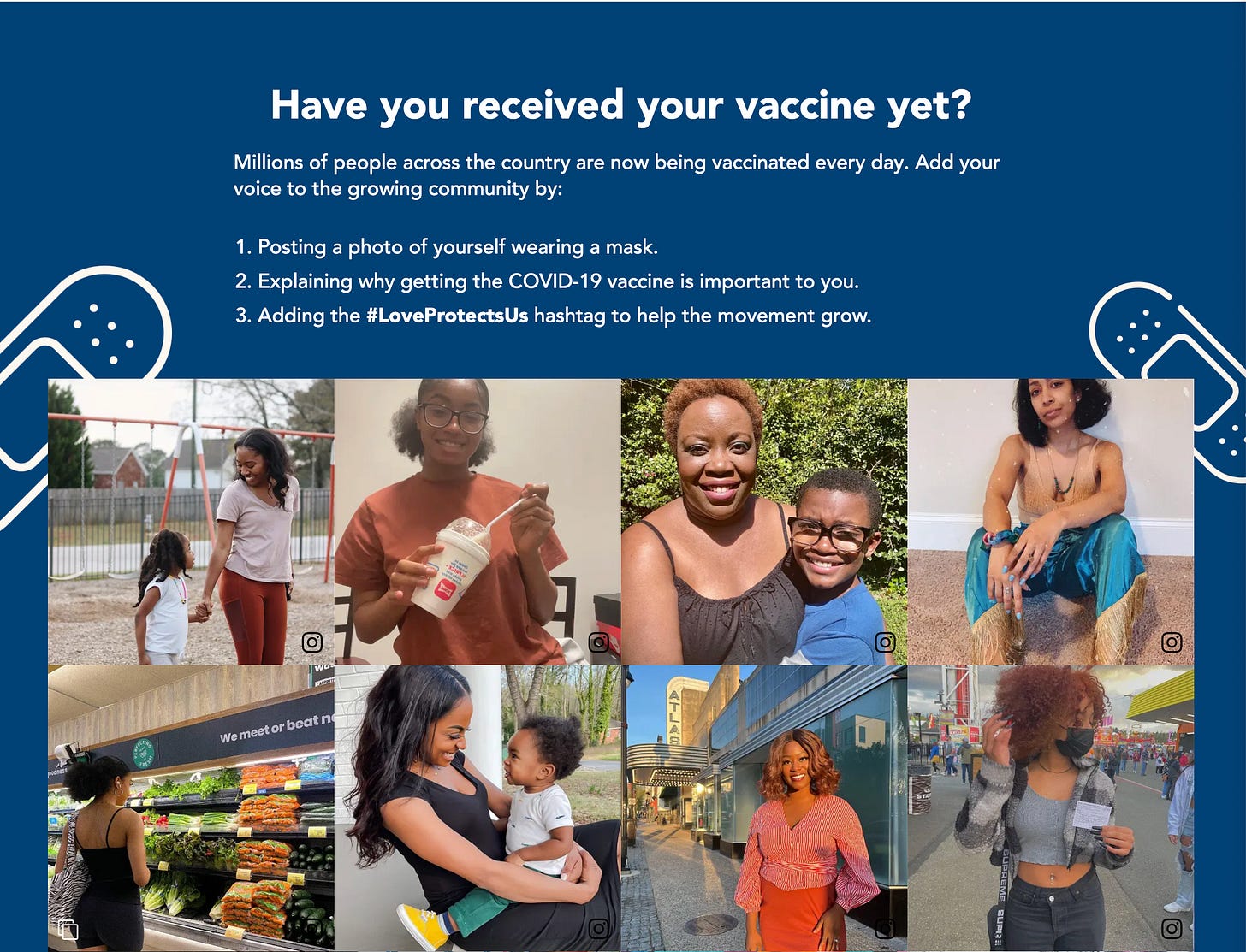#LoveProtectsUs: The Public Good Project's New Vaccine Initiative Leveraging Shame and Guilt to Promote Vaccines
To those who’ve joined me on my exploration of social media’s influence on public health, you likely know about The Public Good Projects (PGP). For those new to Dark Influence, here’s a quick overview of PGP.
The Public Good Projects
The Public Good Projects (PGP) is a “public health nonprofit specializing in large-scale media monitoring programs, social and behavior change interventions, and cross-sector initiatives. PGP applies the best evidence and practices from the public and private sectors to create bold projects for health. PGP’s programs and initiatives are evidence-based, tailored for particular populations, employ a collective impact model, and are scientifically evaluated. PGP is led by experts in public health, marketing, journalism, media, and business. We deploy our considerable resources and relationships to support communities and partners in their mission to make a healthier and more equitable world. PGP is a registered 501(c)(3).”
The Public Good Project deploys influencers and utilizes social media to shape public health narratives.
The Public Good Projects holds a two-star rating as a nonprofit from Charity Navigator, attributed to concerns regarding its financial transparency. Moreover, it possesses only a bronze seal, the lowest level, from Candid/Guidestar for its $7,839,348 2023 earnings. In contrast, American Frontline Nurses proudly displays the Platinum Seal, indicative of the highest level of financial transparency bestowed by Candid/Guidestar.
The Public Good Project specializes in promoting vaccines.
The Newest Public Good Initiative: #LoveProtectsUs
#LoveProtectsUs is a website specifically designed to encourage the black community to get vaccinated against COVID-19. The site features compelling images aimed at inspiring vaccine acceptance, which are displayed below:
Their 60-second video features members of the black community sharing personal stories about their experiences with COVID-19. Here are some poignant quotes:
“Within the black community, we have a complicated history with medicine.”
“I begged my son to please be vaccinated, he kept saying no.”
“Covid had a way of putting his hands on you and keeping his hands on you. I can’t move, I can’t talk.”
Understanding the deep-seated distrust within the black community toward medical care is crucial. Historical events like the Tuskegee Syphilis Study in 1932, where 600 black men were subject to unethical medical experimentation, have left lasting scars. At American Frontline Nurses, where we assist a significant portion of black Americans —approximately 20% of the population we serve— we prioritize providing safe, equitable, and compassionate care. Our Certified Nurse Advocate undergoes rigorous training on addressing the unique needs of vulnerable populations and promoting health equity.
Another noteworthy aspect of the video is the quote likening COVID to having its grip on the individual, juxtaposed with an image of a woman worshipping church, captioned with “she gave praise through song until COVID silenced her.” Having conducted extensive community outreach in the Bible Belt during the Pandemic, teaching the FLCCC protocol for ivermectin, I’ve encountered parishioners who drew strength from their faith, believing that God was guiding and protecting them by putting “his hands” on them. It’s concerning that the narrative appears to dissuade black individuals from attending church, leveraging fear of COVID-19 transmission.
Many in the South and the Bible Belt relied on their faith for support during lockdowns, despite efforts to separate them from their religious communities. Media outlets, like The New York Times, have used alarming headlines and statistics, portraying churches as hotbeds for coronavirus transmission. These tactics seem designed to evoke specific emotional responses, fostering guilt and shame to coerce vaccination against COVID-19 to protect loved ones.
COVID-19 vaccination rates are lagging behind other ethnic groups. Here the CDC analyzes the data:
CDC analyzed data from the National Immunization Survey–Child COVID Module (NIS-CCM) to describe racial and ethnic differences in vaccination status, parental intent to vaccinate their child, and behavioral and social drivers of vaccination among children and adolescents aged 5–17 years. By August 31, 2022, approximately one third (33.2%) of children aged 5–11 years, more than one half (59.0%) of children and adolescents aged 12–15 years, and more than two thirds (68.6%) of adolescents aged 16–17 years had received ≥1 COVID-19 vaccine dose. Vaccination coverage was highest among non-Hispanic Asian (Asian) children and adolescents, ranging from 63.4% among those aged 5–11 years to 91.8% among those aged 16–17 years. Coverage was next highest among Hispanic or Latino (Hispanic) children and adolescents (34.5%–77.3%). Coverage was similar for non-Hispanic Black or African American (Black), non-Hispanic White (White), and non-Hispanic other race† or multiple race (other/multiple race) children and adolescents aged 12–15 and 16–17 years. Among children aged 5–11 years, coverage among Black children was lower than that among Hispanic, Asian, and other/multiple race children. Enhanced public health efforts are needed to increase COVID-19 vaccination coverage for all children and adolescents.
Indeed, there is considerable space for “improvement” in vaccine acceptance within the black community with a very large profit margin for Pfizer. While mainstream research often attributes this to healthcare disparities, systemic racism, and vaccine misinformation, I believe it’s crucial to recognize the intelligence and discernment of all ethnic groups. People can sense when they’re being misled, they also believe what they see with their own eyes.










